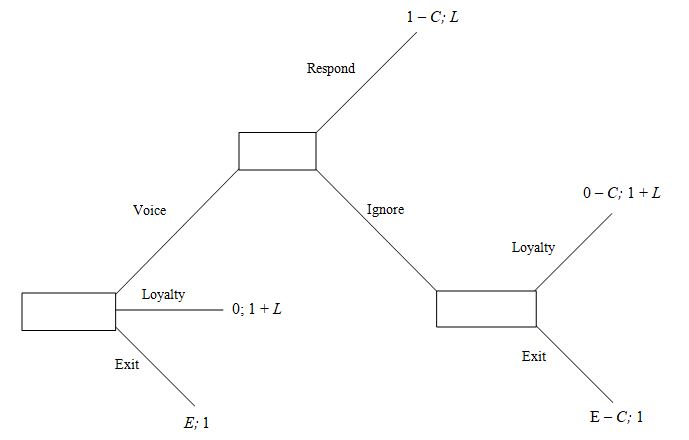What is the subgame perfect Nash equilibrium or equilibria for the game if you use these payoff values?
Below is the Exit, Voice, and Loyalty game between the state and the citizen.Recall that E is the payoff that the citizen gets when she exits, L is the payoff that the state gets from retaining a loyal citizen, 0 is the payoff that the citizen gets from remaining loyal, and C is the cost that the citizen must pay for using voice.
Let E = 0.5, let L> 1, and let C = 0.25.

Recall that the equilibrium should be written in the following form: (citizen’s move at her first node, citizen’s move at her last subgame, state’s move at his [only] subgame).
A. voice, exit; respond
B. voice; exit
C. voice; respond; exit
D. exit, exit; respond
E. voice, respond; ignore
A. voice, exit; respond
You might also like to view...
The Supreme Court has interpreted the Fourteenth Amendment as ensuring that many of the protections in the Bill of Rights apply to the states
Indicate whether this statement is true or false?
Why don't fiscal policy and divided government work well together?
A) When government is divided, it is difficult to enact fiscal policy quickly in response to changing economic conditions. B) When government is divided, fiscal policy can't be initiated or approved by a majority in either the House or the Senate. C) The division of the government prohibits an accurate assessment of the economy as both sides protect their own visions of what needs to be done. D) The division of the government enables independent opinions to emerge that cannot raise a majority of support for their fiscal policy. E) The division of the government creates a fiscal policy that encourages debt by creating too many government programs.
In referendums in 1980 and 1995, the people of Quebec voted on
a) changing to a federal system. b) changing their official language to English. c) seceding from Canada. d) All of the above
Elites tend to be much more interested in politics and more __________
A) apathetic B) lacking in a sense of influence C) participatory D) free of ideology